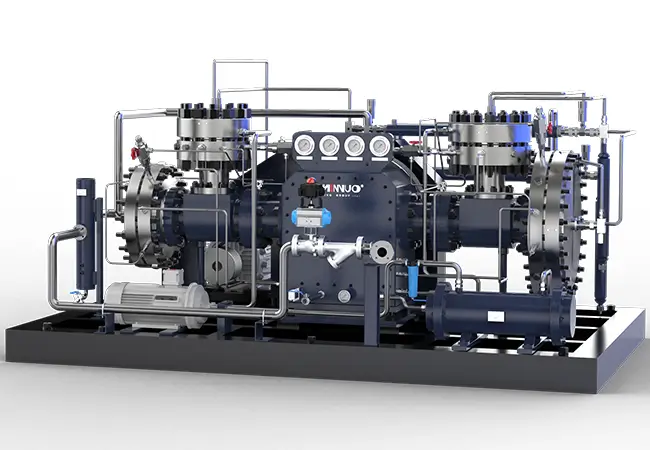With the advent of Industry 4.0, the global industry is moving towards intelligence and digitalization, and the compressor industry has also ushered in a major change. Compressor automation is no longer a distant dream, but a rapidly developing reality. Traditional compressors rely on manual operation and manual adjustment, but now, with the help of intelligent technology, the performance of compressors has been comprehensively upgraded. This article will explore the technical background, core advantages and application areas of compressor automation, analyze how this technology will become the next epoch-making industrial revolution, and predict future development trends.
Through the application of advanced technologies such as intelligent control systems, the Internet of Things, big data analysis and artificial intelligence, compressors can not only achieve autonomous adjustment and real-time monitoring, but also greatly improve operating efficiency, reduce energy consumption and extend equipment life. Automated compressors not only reduce the need for manual intervention, but also improve the safety of equipment, reduce emissions and noise pollution, and promote green production.
Definition and Background of Compressor Automation
What is Compressor Automation?
Compressor automation is the self-regulation and remote monitoring of compressors through advanced scientific and technological means such as intelligent control systems, the Internet of Things, big data analysis, and sensor technology. Compared with traditional manual operation, the automation system can collect equipment data in real time, automatically adjust the working status of the equipment, and ensure that the equipment always operates in the best condition, thereby improving overall production efficiency, reducing maintenance costs, and extending the service life of the equipment.
The necessity of compressor automation
With the acceleration of the global industrialization process, production efficiency and energy consumption have become important indicators of corporate competitiveness. Traditional compressor technology can no longer meet the needs of modern production for high efficiency, intelligence, and energy saving. Especially in high-energy consumption and high-emission industries, the automation control of compressors has become an urgent trend of technological upgrading. Compressor automation can not only achieve real-time monitoring and fault warning, but also greatly reduce manual operation errors and improve the overall efficiency of the production line.

Core technologies of compressor automation
The realization of compressor automation depends on a number of advanced technologies. The following is a detailed introduction to several key technologies.
Intelligent sensor technology
Intelligent sensors are the basis of compressor automation. They can monitor various operating parameters of the compressor in real time, such as temperature, pressure, flow, and vibration. The sensor transmits this data to the central control system to help the system determine the current status of the equipment and make corresponding adjustments. For example, when the temperature is too high or the pressure is too low, the automation system can automatically adjust the working conditions of the compressor to prevent equipment damage or performance degradation.
Internet of Things and Remote Control
Through the Internet of Things (IoT) technology, compressors can achieve remote monitoring and data sharing. The operating status of all equipment is connected to the control system through sensors to form a complete intelligent network, which feedbacks the operating data in real time. The integration of the cloud platform makes equipment management more efficient. Users can remotely view the operation of the equipment through mobile phones or computers, make necessary adjustments, and even diagnose and repair faults.
Big Data Analysis and Artificial Intelligence
Big data analysis and artificial intelligence (AI) technology enable the compressor automation system to have deep learning capabilities. The system collects historical operating data of the compressor, analyzes the operating trends and patterns of the equipment, and thus optimizes equipment scheduling, predicts equipment failures, and repairs them in advance. In addition, artificial intelligence can automatically adjust the operating parameters of the equipment according to real-time environmental changes to ensure that the compressor is always in the most energy-saving and efficient working state.
Automatic Control System
The automatic control system is the core of compressor automation and can adjust the working mode of the equipment according to real-time data. For example, when demand is low, the system automatically reduces the speed of the compressor to reduce energy consumption; when demand surges, the system automatically increases equipment output to ensure stable production operation. Through intelligent control, the compressor not only saves energy, but also avoids waste caused by human operating errors.
Advantages of compressor automation
Compressor automation has brought many technical and management breakthroughs. The following are its main advantages:
Improve production efficiency
Compressor automation can greatly improve production efficiency through real-time data monitoring and intelligent adjustment. Traditional compressors rely on manual adjustment and regular inspections, which are prone to misoperation or delays. The automation system can monitor the status of the equipment 24 hours a day and make adjustments in time to avoid equipment downtime or efficiency loss due to failure or improper adjustment.
Reduce energy consumption
Energy cost is a major expense in compressor operation. The automation system can adjust the operating status of the equipment in real time according to production needs to ensure that the compressor always operates under optimal conditions, thereby effectively reducing energy waste. For example, the automation system can reduce unnecessary equipment loads, avoid idling and excessive operation, reduce electricity and gas consumption, and reduce energy costs.
Improve equipment reliability and lifespan
Through the automated monitoring system, the working status of the compressor can be tracked and evaluated in real time. The system can detect any potential problems in a timely manner and issue an alarm in advance, helping companies take measures before the problem develops into a failure. This not only reduces unexpected downtime, but also avoids excessive wear of equipment, thereby extending the service life of the equipment.
Enhance safety and environmental protection
Compressor automation can improve the safety of equipment. Through automatic monitoring and fault diagnosis, the automation system can detect equipment abnormalities in a timely manner and avoid safety accidents caused by equipment failure. In addition, automation technology can also effectively control the emission level of the compressor, help companies comply with environmental protection regulations, and reduce the emission of harmful gases.
Application areas of compressor automation
Compressor automation has been widely used in many industries, especially in industries that require efficient and stable operation. The following are several major application areas:
Oil and gas industry
In the oil and gas industry, compressors are used for gas compression and transportation. Automation technology can improve the working efficiency of compressors, reduce energy consumption, and ensure the safety and stability of the gas transportation process. Automated compressors can also work stably in extreme environments, reducing manual intervention and maintenance costs.
Manufacturing Industry
In the manufacturing industry, compressors are used to provide compressed air or gas, and automation technology enables these devices to operate efficiently and stably 24 hours a day. Through the automatic control system, the compressor can dynamically adjust the operating parameters according to production needs, ensure the smooth operation of the production line, and avoid production losses caused by downtime.
Chemical Industry
The chemical industry is also highly dependent on compressors. Automated compressors can improve reaction efficiency, reduce energy consumption, and reduce emissions. In the chemical production process, compressor automation technology can ensure stable gas flow and pressure, and avoid production interruptions caused by equipment failure or operating errors.
Food and Beverage Industry
In the food and beverage production process, compressors are used for gas compression and cooling. Automation technology can improve production efficiency and ensure the stability of product quality. The automation system can dynamically adjust the working state of the equipment according to production needs to achieve intelligent production.

Future Development Trends of Compressor Automation
Development towards Higher Intelligence
In the future, with the continuous advancement of artificial intelligence and big data technology, compressor automation will develop towards higher intelligence. Through deep learning and self-optimization, compressors will be able to automatically adapt to different production needs and environmental changes without human intervention, further improving production efficiency.
Promote green manufacturing
With increasingly stringent environmental protection requirements, energy conservation and emission reduction will become the core goal of compressor automation in the future. Automation technology will promote the development of compressors in the direction of green and low carbon by optimizing energy efficiency, reducing exhaust emissions, and reducing noise pollution, helping enterprises to achieve green manufacturing.
Integration and modularization
The future compressor automation system will be more integrated and modular. The system will more closely integrate various sensors, control systems, and actuators to create a highly coordinated intelligent platform. This integrated and modular design will increase the system’s flexibility, allowing for customization and optimization based on different production needs.
Conclusion
The advent of compressor automation is completely changing the way traditional industrial production is done. With the continuous development of intelligent, green and efficient technologies, automated compressors will become an important cornerstone of future industrial production. For enterprises, purchasing automated compressors is not only the key to improving production efficiency and reducing costs, but also an important strategy to gain an advantage in the increasingly fierce market competition. MINNUO has been investing a lot of time and energy in the research and development of compressors, keeping up with the times and constantly replacing machines. Today, compressor automation is no longer a distant future, but a achievable reality. Enterprises should seize the opportunity of this technological change and meet the challenges of the era of intelligent manufacturing.





 Email
Email sales:+86 15366749631
sales:+86 15366749631

